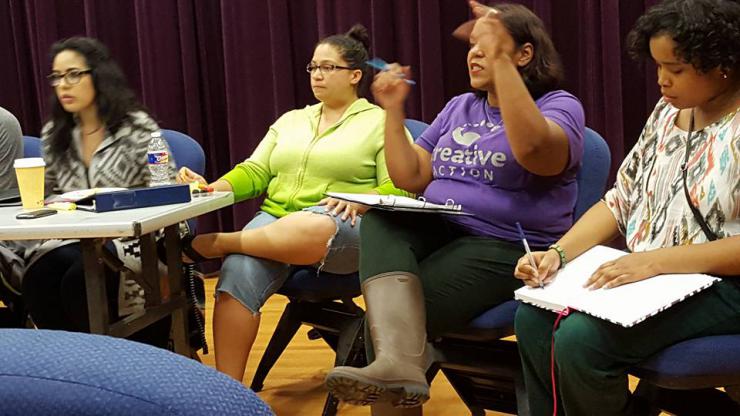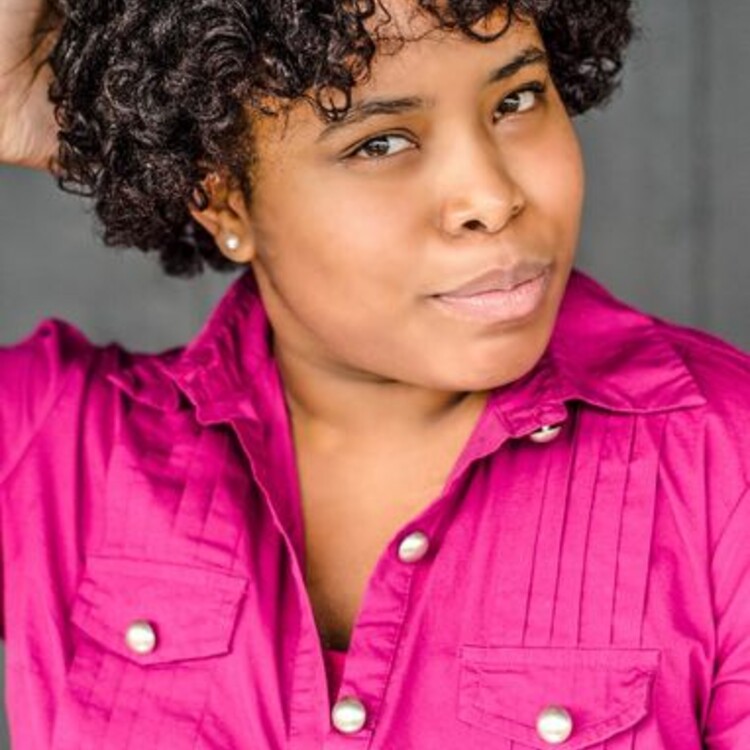Why We Need Afro Latin@ Theatre
When my play The Stories of Us was chosen for the Teatro Vivo's annual Austin Latino Play Festival 2015, I was shocked to say the least. My play was Black—Blacker than Black. It called out African Americans, Latin@s, and Afro Latin@s for the broken bonds between us, racism, and many things that we fail to say in normal conversations. I confided in a colleague about my nervousness about work being in that space and he told me, "It's needed there." Although I am not Afro Latin@, I identify with Afro Latin@ experiences. Being a Black American and speaking Spanish in Texas, I am often met with the question "You know Spanish?" or "How did you learn Spanish?" These questions reflect the lack of exposure to Afro Latinidad and the hidden erasure of these stories. Why is my language ability even a question?
Navigating Latin@ theatre spaces as a Black American has been an awesome experience for the most part. My work has had a significant amount of support by Latin@ artists. In 2013, I attended the National Association of Chicana and Chicano Studies conference at the then University of Texas Pan American (now Rio Grande) with UT Professor Roxanne Schroeder-Arce. I was a part of an outstanding group of student artists from both Pan-American and UT Austin that devised a bilingual performance piece on culture and identity. I felt empowered in the space and made sure that my identity as was visible. Each actor in the piece came up with a line that represented their identity. My line “I am La Negra que Tiene Tumbao from the famous Celia Cruz song” sparked a conversation amongst my peers about Afrolatin@ identity. In artistic spaces, I feel at home, but it’s the everyday erasure of Blackness in Latin@ theatre that I strive to fight against.

This is something that not just television and film needs to address, but theatre too. When I hear about a call for Latin@ Theatre artists, my deepest hope is that the results represent the diversity of Latinidad. We know that the term "Latin@" stretches beyond the olive-colored Jennifer Lopez looking Latin@. Encountering a person who inquires about my learned Spanish, I wonder if they are aware of the rich African culture in the Latinidad. Have they not heard of La Lupe? Celia Cruz? Laz Alonzo?
It is up to theatre to reflect that truth. In the casting room, limiting "Latin@" roles to actors who look like Mario Lopez is an act of erasure. It limits our access to the reality. What about the young Afro Latina seeing a show and searching for herself on stage? Afro Latin@s need to be visible in theatre because it will inspire future artists that come behind us. Not only do Afro Latin@s need to be visible on the stage, but they should also take over festivals, rocking the community theatre circuit, or bowing after an epic Broadway show.
One of the most prominent voices in theatre right now is Crystal Roman, an actress and writer who took her experiences as an Afro Latina and put them in a piece called Black Latina the Play. Her piece not only brings to light the cultural specifics of growing up as a Black Latina, but also focuses on the range of emotions felt by Afro Latinas as a result of their experiences. Many times in work that champions cultural stories, we focus on the cultural part for the sake of focusing on it. We fall into the "writing the race play" category and fail to understand that by having Afro Latin@ bodies on the stage, we are already creating those conversations.
We need Afro Latin@ theatre. Not to fill a quota, or have the story for the Latin@ festivals, but so that young Afro Latin@s can see themselves on the stage. So that young Afro-descendants can grapple with the intersectional points of Blackness, and we can come together and feel the stories.
Afro Latin@ theatre can be found in a multitude of places. The LatiNegrxs Project, a digital archive of Afro Latin@ media, does a great job of championing Afro Latin@ artists of all types. On the website, you will find articles about performance events all over. The Afrolatin@ Forum is another great resource for Afro Latin@ artistic expression. Their latest conference in 2014 featured theatre, poetic, and visual artists from all over. Resources for Afro Latin@ theatre are emerging with the wave of artists taking the reins and creating their own teatro!
I am not saying not to have the experience of the Puerto Rican college student being pulled over for DWB (Driving While Black) in your play. I am saying that Afro Latin@ theatre needs to reflect the intricate moments of personhood: the struggles of dealing with family, the whole finding-out-who-you-are debacle, and discovering your talents. That is what these plays need to reflect because this is life: People of Color on the stage living life, just being unapologetically Black and Latin@.
Perhaps, we need to extend the definition of what "theatre" means. For me, it includes poetry, music, and other forms of art as well. After all, much of it is presentation on a stage (or television). Poetry mavens like Ariana Brown perform Afrolatin@ theatre every time they spit fire on the stage. Her tales of growing up, speaking out, and self-love captivate her audience and speak an Afro Latin@ truth that stretches beyond the surface.
We need Afro Latin@ theatre. Not to fill a quota, or have the story for the Latin@ festivals, but so that young Afro Latin@s can see themselves on the stage. So that young Afro descendants can grapple with the intersectional points of Blackness, and we can come together and feel the stories. This is my call to action. Let’s get more of Afro Latinidad in theatre. Let’s allow it to complicate our notions of race, ethnicity, and identity, but most importantly, let’s allow it to help us see that the fabric of Latinidad is intertwined with Blackness and vice-versa. Pa’Lante.


Comments
The article is just the start of the conversation—we want to know what you think about this subject, too! HowlRound is a space for knowledge-sharing, and we welcome spirited, thoughtful, and on-topic dialogue. Find our full comments policy here
Important work, and great post. So many of my students are Afro-Latin@ and so much of Afro-Latin@ history and current lives is erased. Was just looking at the wikipedia page forToña la Negra - no mention that she was Afro-Mexican.
Pa'lante, Siempre Pa'lante
Thank you for sharing your work here, Jelisa. You raise some important issues about representation and making spaces for a plurality of voices. We 100% need more Afro-Latin@ voices, not just in theatre, but in all forms of cultural production. I look forward to seeing your work and I hope you continue to use this space to write about Afro-Latinidad and your experiences as a playwright of color.